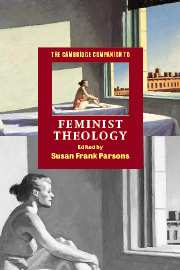10 - The Holy Spirit and spirituality
from Part two - The themes of feminist theology
Published online by Cambridge University Press: 28 May 2006
Summary
INTRODUCTION
The Holy Spirit, it is often noted, has been much neglected in Western theology and, when given serious theological consideration, usually subordinated to the Father and the Son, a kind of Cinderella of the Trinity. Alwyn Marriage comments: 'There is little doubt that our doctrine of the Holy Spirit is one of the least developed areas in mainstream Christianity.' Elizabeth Johnson notes the variety of metaphors employed by contemporary theologians to express this neglect of the Spirit: the Spirit is imaged as 'faceless' (Walter Kasper), 'shadowy' (John Macquarrie), 'ghostly' (Georgia Harkness), or 'anonymous', the 'poor relation' in the Trinity (Norman Pittenger), the 'unknown' or 'half-known' God (Yves Congar); in Johnson's own phrase, the Spirit is the 'forgotten God'.
Multiple reasons may be adduced for this Western neglect of pneumatology: the comparative paucity of scriptural reflection on the Spirit, coupled with the mysterious nature of the scriptural images and narratives which do exist; the pattern of classical theology which proceeded from consideration of the Father to the Son and only ‘in third place’ to the Spirit so that treatment of the Spirit often received short shrift; the privatisation of the Spirit’s activity to the sanctification of the individual in post-Reformation Protestantism, mirrored by the displacement of the Spirit’s functions onto the pope, the Blessed Sacrament, or the Virgin Mary in post-Tridentine Catholicism; and, most significant for our reflections, the association of the Spirit in the Bible with female imagery and experience so that the Spirit became marginalised and repressed just as women themselves did.
- Type
- Chapter
- Information
- The Cambridge Companion to Feminist Theology , pp. 171 - 189Publisher: Cambridge University PressPrint publication year: 2002

